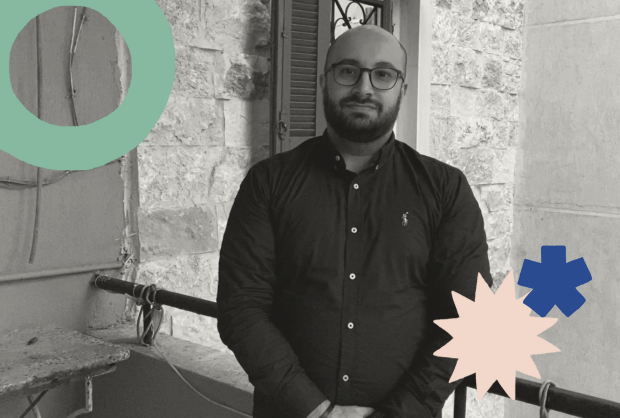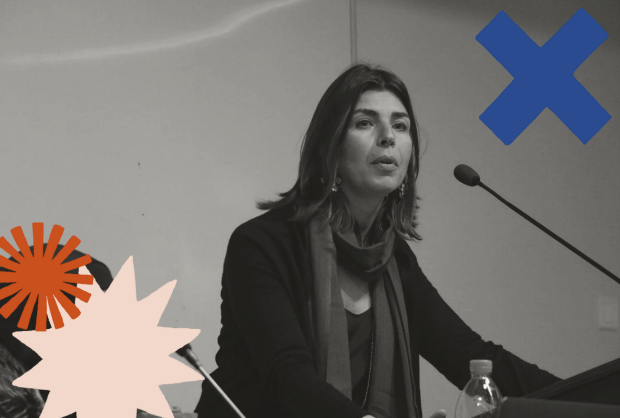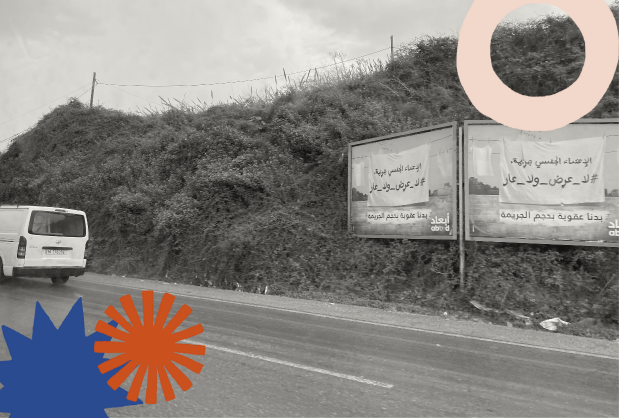“Rape is a crime”
You cannot drive many hundred meters on a main road in Lebanon right now without that message leaping into your eyes from large signs on the roadside.
They appear on the roads in and outside the capital Beirut, but also far out on the dusty roads in the region of Bekaa in east Lebanon and on the congested roads leading to the main cities in the northern Tripoli region.
It is ABAAD, the largest knowledge center for gender equality in the country, which has produced the campaign. According to the organization’s senior program support lead, Khaled Yamout, the fact that it can take up so much space in the public space alone is a symbol of how much has happened regarding attention to gender-based violence in the country over the last few decades.
“When I started working in this field 17 years ago, it was completely taboo to talk about anything to do with gender or sex and violence. No one dared to bring it up,” he says.
Yamout points out that Lebanon is fundamentally a patriarchal society where there are countless cultural, religious and political barriers to working with gender-based violence.
“But a lot has happened since then. When we measure the reactions to our campaigns and our presence in the media now, there is much more support and a broad understanding that gender-based violence exists. An understanding that it is quite widespread in our society is beginning to emerge. At a certain point, women considered violence normal and men considered it part of their rights. Now most people know, one way or another, that it is wrong,” he says.

The message in ABAAD’s current campaign is that the country needs higher penalties for rape. The growing knowledge of the problems related to gender-based violence should lead to a large number of legislative changes in the area, when it comes to the penalty framework, and especially when it comes to more rights for victims of gender-based violence, believes Yamout.
Until recently, gender-based violence had also started to take up more and more of the political agenda. However, after many years of progress, he sees that the the deep economic crisis, now in its third year, means more setbacks for the work against gender-based violence in Lebanon.
“We can start talking about gender equality after the crisis”
Just a few years ago, Lebanon was often referred to as the Switzerland of the Middle East, and large parts of the Lebanese population had a high standard of living. Since then, Lebanon has ended up in an economic and financial crisis described by the World Bank as one of the worst in the world.
Skyrocketing inflation rates have caused the middle class to largely disappear and the poor sections of the population to only become even poorer.
“In this situation, it is really difficult to keep issues of violence and gender on the agenda. The politicians and other stakeholders tend to say that gender-based violence is not important right now, it is not our biggest problem. They say ‘when things are in order, we can start talking about gender equality again’”, says Yamout.
Gender equality in Lebanon
The UN’s gender equality index counts 191 countries.
Lebanon is currently ranked 112th and it is going the wrong way at the moment. Last year they were number 92.
Myriam Sfeir, head of The Arab Institute of Women at the Lebanese American University, also describes the same development.
“There have definitely been improvements. The problems surrounding gender-based violence are certainly more visible, there is certainly more action, the organizations have more resources and more reach, but there is still a great deal to be done politically in relation to securing women’s rights – and it has come to a standstill now, she says.
According to Sfeir, the most important steps forward would be to pass a civil law and to change the personal status legislation in the country. She believes that it is necessary to have one single law that applies to everyone and, among other things, regulates how people get married, how they get divorced and how they get custody of children.
“As an example, let’s say that my husband beats me at home. With the rules as they are today, I can be the director of this institute, but still have to stay with my husband even though he beats me. Simply because I don’t want to lose custody of my son, who is seven years old and thus at an age where my husband can take him away from me and invent all sorts of stories about me, and they will be accepted by the religious courts,” she says.
However, these changes seem much further away now, she believes.
“Because our economy is falling apart, our political system is falling apart, our health care system, our education system. There are so many issues.”
Multiple crises put pressure on the households
At the same time, the crisis itself, combined with the COVID-19 lockdowns and the big explosion at the port in Beirut two years ago, has caused the violence to increase.
ABAAD has a 24-hour hotline for victims of gender-based violence. The number of calls increased by several hundred percent during the COVID lockdowns and is still high.
Further, the inflation means that the prices of basic foods have multiplied in just a few years, and that unemployment has increased. This has a heavy impact on people’s livelihood and living conditions.

After three years of economic crisis, 91 percent of the Syrian families in the country and 55 percent of the Lebanese families live below the poverty line, according to the UN.
The huge challenge is the devaluation of the lira, Sfeir believes.
“It creates a lot of financial pressure, a lot of tension in homes because they can’t get as much for their wages anymore or maybe they’ve lost their income altogether, and that often results in more violence.”
This applies both at home and on the labor market, she emphasizes, and points out that we do not know how many women that have lost their jobs due to the crisis. How many who are now working informally, without the security of a contract – they are far more exposed to sexual abuse or assault, she believes.
“We cannot be sure that some employers do not demand sexual favors from women in order to pay their wages. There is no contract, and in this situation, women will accept anything just to have a job. They have to get their wages so they can buy food for their children, says Sfeir.
Small, local progress
While the political level is difficult to reach, Sfeir believes that awareness work has only become even more important, both digitally and locally.
She emphasizes, among other things, how important it is to continue with large campaigns on social media, because they reach men and women in the country, who might otherwise be difficult to reach, and in a different way.
ABAAD AND KVINFO
Since the summer of 2021, KVINFO has been working together with ABAAD against gender-based violence in Lebanon.
The partnership has helped to expand ABAAD’s work in supporting and offering emergency protection and socio-economic assistance to girls and women who have experienced or are at risk of gender-based violence. At the same time, the partnership has focused on activities that strengthen the women’s understanding of gender-based violence and their opportunities to earn a living in the longer term. Including upgrading workshops.
The project targets Syrian refugees and their vulnerable host communities in two of the most vulnerable districts – Tripoli in northern Lebanon and Bekaa in eastern Lebanon. According to the UN Development Program and VASyR (The Vulnerability Assessment of Syrian Refugees in Lebanon), the refugee and host communities in Qobbeh in Tripoli and Qab Elias in Bekaa are some of the most vulnerable.
ABAAD – Resource Center for Gender Equality – is a UN ECOSOC accredited organisation that aims to achieve gender equality as an essential condition for sustainable social and economic development in the MENA region.
The collaboration between KVINFO and ABAAD is financed by Novo Nordisk Foundation with a grant that expires at the end of 2022.
“When you get many people to share videos of their experiences, it can simply show what kind of violence women are exposed. The videos work as a kind of ‘proof’ that gender-based violence is an important problem for those who doubt it. When you don’t just read about it, but see examples with your own eyes, it makes a huge difference and helps spread awareness,” she says.
At the same time, the crisis makes it even more important to target gender-based violence in the most vulnerable parts of the country, she believes.
“The challenge is to reach everyone, including those on the periphery. Most of our academic work and the work of the organizations has been done in the cities, but there is still a need to work with knowledge and with awareness in the outlying areas. There is enough work for the next several years,” says Sfeir.
Women inspire women
Among other things, ABAAD runs midway houses in some of the most vulnerable areas in the country – Bekaa in eastern Lebanon and Tripoli in the north. Large parts of the Syrian refugees that the country houses live here and the local communities are also poor.
Alongside the acute help to victims of gender-bases violence, the organization has projects where they bring together women exposed to violence for psychosocial activities, such as workshops about violence, self-esteem and rights – and for upskilling workshops.
While Khaled Yamout is quite pessimistic about the possibility of achieving political results right now, it is precisely in this local work in the outer regions of the country that he sees signs that there is also a positive development going on despite the crisis.
For example, today ABAAD experience that quite many women approach them directly instead of being referred by other organizations like in the past.
“Information spreads. In recent years, we have started to experience that many women who have been in contact with us and are now able to identify other women in their family or community who have suffered or are suffering from gender-based violence. We are also beginning to see many cases where women come back from their discussions with us and create initiatives in their local community, for example a small women’s community. Or they do information work, where they reach out to the rest of their local community and talk about gender-based violence,” he says.
With the increasing rates of violence, awareness still does not solve everything, emphasizes Yamout. However, he points out that it is important to ensure that the awareness work continues while the country suffers from the many other problems.
“We see small, local improvements, step by step, while we wait for the overall changes – and then we continue to demand reporting mechanisms, and better legal systems the best we can,” he says.

